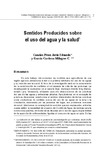| dc.rights.license | http://creativecommons.org/licenses/by-nc-sa/3.0/ve/ | |
| dc.contributor.author | Canelón Pérez, Jesús Eduardo | |
| dc.contributor.author | García Cardona, Milagros | |
| dc.date.accessioned | 2015-03-04T15:39:16Z | |
| dc.date.available | 2015-03-04T15:39:16Z | |
| dc.date.issued | 2015-03-04T15:39:16Z | |
| dc.identifier.issn | 0798-3069 | |
| dc.identifier.uri | http://www.saber.ula.ve/handle/123456789/39884 | |
| dc.description.abstract | En este trabajo interpretamos los sentidos que agricultores de una
región agrícola venezolana le dan a la práctica cotidiana del uso de las aguas
y su relación con la salud. El foco de la investigación está en la comprensión
de la construcción de sentidos en el espacio de vida de las personas. La
investigación la realizamos en el caserío Bojó, municipio Andrés Eloy Blanco,
estado Lara, Venezuela, utilizando para ello observaciones de las prácticas
del uso de las aguas y entrevistas abiertas. Apoyándonos en el concepto de
prácticas discursivas construimos el análisis interpretativo de dichas prácticas
como productoras de sentidos acerca del uso de las aguas en la zona y la
vinculación, reconocida por las personas del lugar, con problemas comunes
de salud. Mostramos la complejidad de sentidos que son expresados, entre los
cuales están: la necesidad de creación del Comité de Agua, de normas para la
convivencia pacífica, en medio de las disputas por el uso del agua y la posibilidad
de la aparición de enfermedades ligadas al consumo de agua no apta. En las consideraciones generales planteamos que es necesario hacer un seguimiento a
la disposición de aguas residuales en el caserío y que se debe dar asesoramiento
a los productores en el uso de ese tipo de aguas. | es_VE |
| dc.language.iso | es | es_VE |
| dc.rights | info:eu-repo/semantics/openAccess | |
| dc.subject | Producción de sentidos | es_VE |
| dc.subject | Prácticas cotidianas | es_VE |
| dc.subject | Uso del agua | es_VE |
| dc.subject | Salud | es_VE |
| dc.title | Sentidos producidos sobre el uso del agua y la salud | es_VE |
| dc.title.alternative | Construction of a protocol to know lifestyle and health | es_VE |
| dc.type | info:eu-repo/semantics/article | |
| dc.description.abstract1 | In this project, we interpret the senses that farmers, from a Venezuelan
agricultural region, give to their use of water on a day to day basis as it relates to
their health. The focus of the investigation is the understanding of the construction
of the senses in the living space of real persons. We researched the investigation
in the Bojó village which is part of the Andrés Eloy Blanco County in Lara,
Venezuela. We used the observations of the practical uses of water and open
interviews for this particular research project. Supporting ourselves in the concept
of discursive practices, we construct the interpretative analysis of such practices
as producers of the senses about the use of water in the zone and linked to the
common health problems recognized by the people of the region. We show the
complexity of the senses that are expressed among the following: the necessity
of the creation of a Water Committee, standards for a peaceful coexistence amid
disputes over water use and the possibility of the occurrence of diseases linked
to the consumption of unsafe water. In the general considerations, we argue
that it is necessary to monitor the wastewater disposal in the village and to give advice to farmers on the use of such waters. | es_VE |
| dc.description.colacion | 7-32 | es_VE |
| dc.description.email | jcanelon@yahoo.com, jecanelon@ucla.edu.ve | es_VE |
| dc.description.email | mgarcia03@yahoo.com | es_VE |
| dc.description.frecuencia | trimestral | |
| dc.subject.centroinvestigacion | Centro de Investigaciones en Ciencias Humanas (HUMANIC) | |
| dc.subject.facultad | Facultad de Humanidades y Educación | es_VE |
| dc.subject.keywords | Production of senses | es_VE |
| dc.subject.keywords | Everyday practices | es_VE |
| dc.subject.keywords | Water use | es_VE |
| dc.subject.keywords | Health | es_VE |
| dc.subject.publicacionelectronica | Revista Fermentum | |
| dc.subject.seccion | Revista Fermentum: Artículos | es_VE |
| dc.subject.thematiccategory | Artes y Humanidades | es_VE |
| dc.subject.tipo | Revistas | es_VE |
| dc.type.media | Texto | es_VE |


